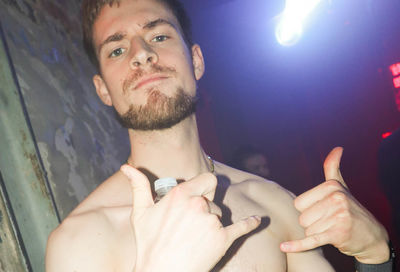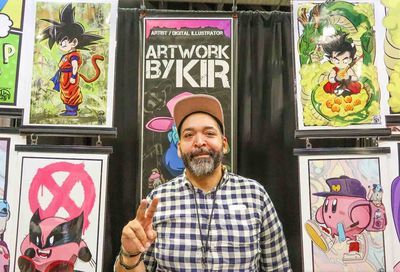Duct and Cover
Learning Curve
Sometimes I feel like I’m in between Iraq and a hard place. But seriously, folks — for lesbian feminists, the question of women in the military has never been more of a double-edged sword (presumably sheathed in a strong Marine scabard). Many of my friends who are strong advocates for full integration of women into the armed forces remain unconvinced by the push for a U.S. war in Iraq. And other friends observing the present rape scandals emerging from the Air Force Academy in Colorado fear that the military will never foster a climate of respect for servicewomen, let alone budge on the question of lesbians and gays.
|
Meanwhile, the war-frenzied media feasts on images of reservist moms in uniform being torn from their children, and those women already positioned with U.S troops shipped to the Middle East must confront the extraordinary gender etiquette of Islam-based countries (remember that during the Persian Gulf War, female soldiers in Saudi Arabia had to be veiled and escorted by men any time they headed into town). As a 41-year-old lesbian in a land with a volunteer army, I’m in no danger of being drafted myself. But the inner cacaphony of mixed feelings makes it hard to sleep at night.
Right now, twenty-five very sharp women’s history students are taking my GWU course “Women and War,” where the question of patriotic womanhood — including the military’s “Don’t Ask, Don’t Tell” policy officially banning lesbians from the armed forces — is central to our curriculum. For a full semester, we’re immersed in stories of bold women who defied the restrictions of their times: Deborah Sampson, who passed as a boy in order to fight during the American revolution; the similarly boysih Joan of Arc, burnt at the stake for cross-dressing after leading France to victory; the wonderfully named Civil War nurse Mary Ann Bickerdyke; the World War I Russian women’s all-female corps, the “Battalion of Death;” the WASPS [Women’s Air Service Pilots] of World War II who only recently gained recognition for having served in the military; the British lesbian ambulance drivers sent into WWI France, depicted in Radclyffe Hall’s groundbreaking lesbian novel, The Well of Loneliness.
Against this backdrop, my students begin the same debate revived by every war: is it both patriotic and feminist to push for full inclusion of women in combat roles and Pentagon careers? Or should feminists advocate pacifism, and resist the call to militarization and the homophobic army?
We can agree that ultimately, feminism is about having choices. Thus I accompany my students to peace marches and protests, but I’ve also mentored several female Marines, male and female students in ROTC, and a number of closeted servicewomen. I support the Servicemembers Legal Defense Network (kudos to my heroine pal Sharra Greer), and in the past I’ve been a guest lecturer for the National Guard and, before it merged with VMI, the temporary service academy Virginia Women’s Institute for Leadership. I’m a graduate of a pacifism-based Quaker high school, yet as a Jew I also admire my foremother Hannah Senesh, who parachuted into Nazi Europe to liberate prisoners and, ultimately, gave her life for her beliefs, expiring under torture without giving the information her Nazi captors wanted. Instead, Hannah penned these words: “Blessed is the match consumed in kindling flame.” Now that’s a tough Jewish girl. Am I ready to give my life for freedom? Would I have parachuted into the infamous rape camps of Bosnia to free captive women, if asked? Depends on who’s asking.
Out for a stroll at the National Zoo last fall, I was struck by the sight of troops of Young Marines, D.C. kids in junior uniform, collecting money for their program. When I was approached and asked to make a donation, I said almost without thinking, “No thanks, pal, I’m gay” — the same reply I would have offered a Boy Scout. My companion, Toni, was impressed by my casual decision to come out to a child. I felt that an eleven-year-old black male was old enough to understand the connection between government-sanctioned discrimination and my reluctance to thrown some hard-earned lesbian dollars into his bucket. Yet I’m also keenly aware that in America’s working-class communities, especially those populated by people of color, the military holds out funding for education and healthcare that are simply unavailable through other channels. For this reason, and because I know so many black lesbians who are ex-military themselves, I cringed when one feminist folksinger declared at the East Coast Lesbian Festival a few years ago, “People in the military aren’t really people.” Her audience was filled with women whose life stories said otherwise.
Now the reality suggests that, absent a draft, the coming war will land disproportionately on the backs of black and Latino/a soldiers — not the disproportionately white, Jewish college women I teach. Will unmasking a gay identity halt the progression of women already being sent to Kuwait? Skilled specialists are less likely to be summarily dismissed if they’re discreet, yet recent gay purges at that defense language institute in California suggest even badly-needed fluency in Arabic, Farsi or Pashto plays second fiddle to mandatory heterosexuality. Would we claim a fallen gay hero in this war?
There’s no denying that lesbians have a proud tradition in the military, no matter how much their presence has been hushed up, denied, debated or met with dishonorable discharges. Texts like Allan Berube’s Coming Out Under Fire, Leisa Meyer’s Creating G.I. Jane and Col. Margarethe Cammermeyer’s Serving in Silence make plain the contributions of gay women to our military, and I make certain my students are familiar with these sources. What’s interesting and ironic is that anti-war activists are so often stereotyped as gay when many aren’t — “Commie fag” being an epithet hurled at peace activists as long as I can recall.
Teaching a class where the focus is on how war impacts women, I note in my lectures that the same mixed messages that made Joan of Arc a martyr haunted female veterans of World War II (who, in 1950s bars, could once again be arrested for wearing pants). I want my students of women’s history, living through these times, to study what sort of behaviors are praised in both men AND women in wartime, –heroes whose lives, if they are gay or gender deviant, are later scorned or abandoned in times of peace. No matter how conflicted I am about the role of the military, I feel an obligation to remember the names of the lesbians who dared to go and fight.
Bonnie Morris can be emailed at bmorris@metroweekly.com.
Support Metro Weekly’s Journalism
These are challenging times for news organizations. And yet it’s crucial we stay active and provide vital resources and information to both our local readers and the world. So won’t you please take a moment and consider supporting Metro Weekly with a membership? For as little as $5 a month, you can help ensure Metro Weekly magazine and MetroWeekly.com remain free, viable resources as we provide the best, most diverse, culturally-resonant LGBTQ coverage in both the D.C. region and around the world. Memberships come with exclusive perks and discounts, your own personal digital delivery of each week’s magazine (and an archive), access to our Member's Lounge when it launches this fall, and exclusive members-only items like Metro Weekly Membership Mugs and Tote Bags! Check out all our membership levels here and please join us today!




















